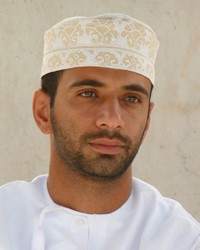Arab, Omani in Kuwait

Photo Source:
CharlesFred - Flickr
Creative Commons
|
Send Joshua Project a map of this people group.
|
| People Name: | Arab, Omani |
| Country: | Kuwait |
| 10/40 Window: | Yes |
| Population: | 24,000 |
| World Population: | 3,096,000 |
| Primary Language: | Arabic, Omani |
| Primary Religion: | Islam |
| Christian Adherents: | 0.10 % |
| Evangelicals: | 0.09 % |
| Scripture: | Translation Started |
| Ministry Resources: | No |
| Jesus Film: | No |
| Audio Recordings: | Yes |
| People Cluster: | Arab, Arabian |
| Affinity Bloc: | Arab World |
| Progress Level: |
|
Introduction / History
Kuwait is a small Arab nation wedged between Iraq and Saudi Arabia at the north end of the Persian Gulf. The Omani Arabs represent less than one percent of the country's total population. Omanis most likely immigrated to Kuwait from Oman during the 1800s. The Omani are set apart from other peoples in Kuwait by their unique use of the Arabic language. Prior to 1964, Kuwait was a very poor country. Today, however, it is one of the most progressive countries in the world. With the wealth they obtained from selling oil, Kuwait's rulers turned a desert wilderness into a prosperous welfare state. In fact, this tiny nation possesses one-tenth of the world's oil reserves, making it one of the wealthiest nations per capita. With such a situation, Kuwait attracts foreign workers from all over the Muslim world including Oman.
What Are Their Lives Like?
Because the overwhelming majority of Kuwait's population is urbanized, Omani Arabs have adapted to a modern way of life. For centuries, housing in Kuwait consisted of small cottages, mud huts, and a few larger homes plastered with cement or limestone. However, in recent years, housing conditions have improved tremendously. The government is using much of its oil revenues to modernize the country in other ways as well. For example, Kuwait now has quality public health services. Free education is provided for students in kindergarten through college. This includes free meals, clothing, books, and transportation. Kuwait has also improved their network of roads and air transportation is highly advanced.
Unfortunately, Kuwait has no reusable water and must rely on wells and purified sea water. Most of the country's food must be imported. Today, there are relatively few jobs in the oil industry because most of the work is done by machines. The government is trying to provide more jobs by encouraging the growth of economic activities rather than oil production.
The Omani Arabs in Kuwait live in extended family units. Their society is patriarchal, or male-dominated. However, the men do not abuse this authority because they believe that their families should obey them out of respect, rather than fear. The Omani Arab women have a greater role in society than most women in Kuwait. Those with specialized skills are now encouraged to go to school and work. Although the women have great influence over their husbands and sons, public life is still considered a "man's business."
What Are Their Beliefs?
Omanis were among the first people to embrace Islam. They are overwhelmingly Ibadi Muslims, a branch that is similar to Sunni Islam. The Ibadis favor the selection of their imams through consensus not heritage. In that way they differ from the dominant Sunni sector of Islam. Some would describe the Ibadi sector of Islam as moderately conservative. As far as we know there are almost no followers of Christ among the Omani Arabs and no fellowships of believers.
What Are Their Needs?
Omani Arabs need the chance to flourish economically so they don't have to migrate to other countries like Kuwait. They also need the chance to hear and respond to the claims of Jesus Christ so they can experience the abundant life He offers those who follow Him.
Prayer Points
Pray for persons of peace among Omani Arabs to open the door to the gospel among their communities and family members.
Pray for Omani Arabs in Kuwait to have open hearts to the one who offers life to the full.
Pray for a massive movement to Christ among Omani Arabs no matter where they live.
Pray for Christ's ambassadors to go to them until there is a Disciple Making Movement.